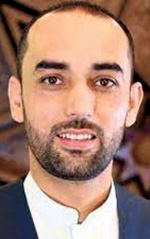An Afghan Interpreter’s Journey to the U.S.
Look inside the evacuation through the eyes of an Afghan ally who worked for the United States for more than a decade but still hasn't received his Special Immigrant Visa.
BY AHMAD KHALID SIDDIQI
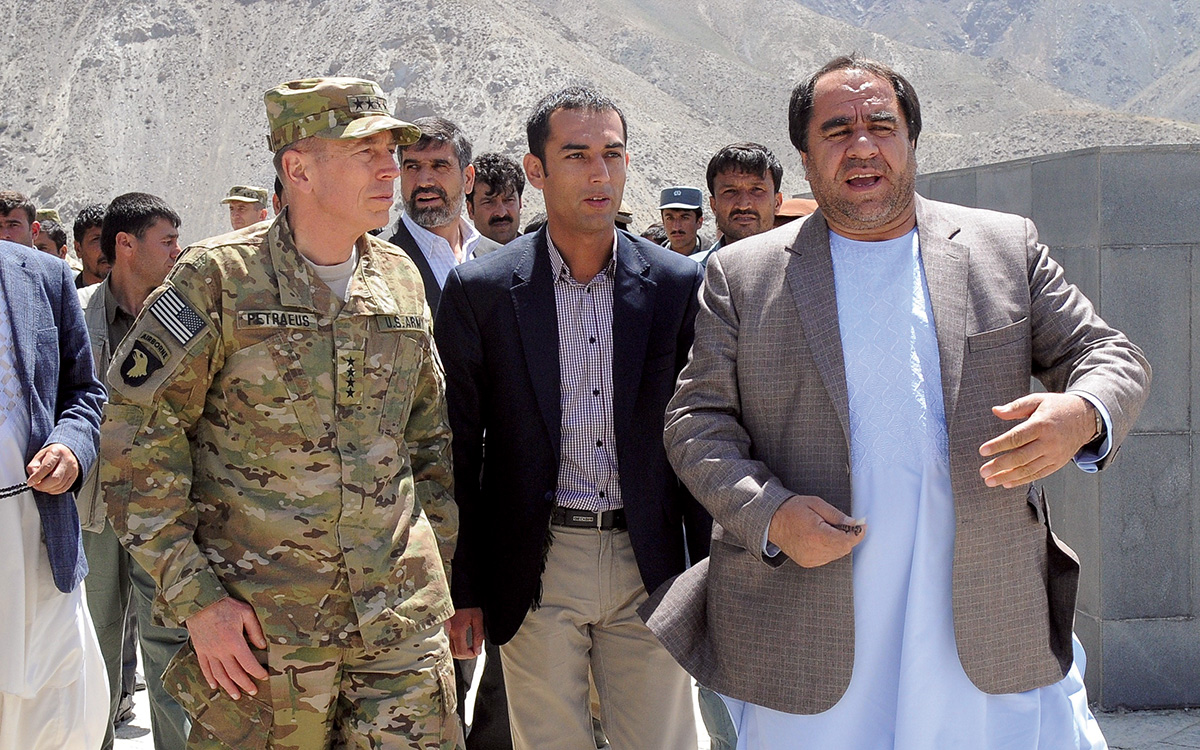
General David Petraeus (at left) walking with interpreter Ahmad Khalid Siddiqi and the governor of Panjshir province, 2010.
Courtesy of Ahmad Khalid Siddiqi
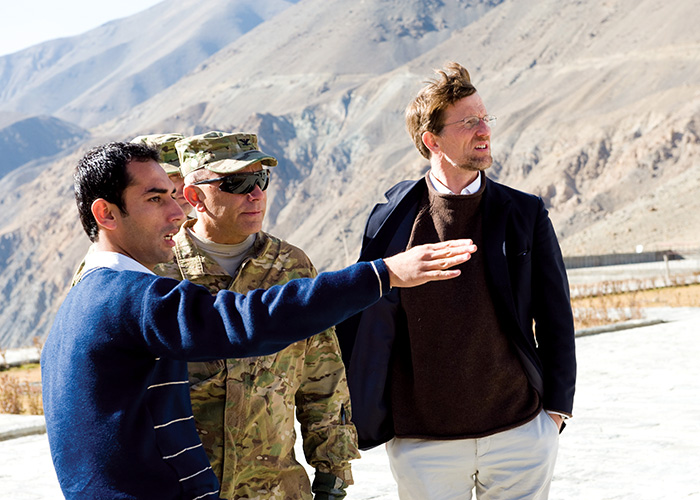
Ahmad Khalid Siddiqi (at left) with Bagram base commander (center) and PRT Director Williams Martin in Panjshir province, 2010.
Courtesy of Ahmad Khalid Siddiqi
I’m very pleased and honored to share my story. It’s not only a story about me; it’s the story of thousands of men and women who worked with the U.S. government in Afghanistan, in many different fields, supporting the mission in Afghanistan.
My full name is Ahmad Khalid Siddiqi, and I started working with the U.S. government in 2003. My first job was as a cashier for the Army Air Force Exchange Service, which was the PX in Bagram. I was very young, just out of high school. It was an opportunity to see what it was like to work with internationals and with the military. That’s where I decided, “This is where I would like to work.” The same year, I was hired as an interpreter for the U.S. armed forces.
Since I was able to speak Farsi and Pashto, I was sent to Khost province where I worked with interrogation departments. I was also in Bagram [Parwan province], back and forth working with intelligence. Then I worked as an interpreter in Paktika province. It was a very remote place on the Afghanistan-Pakistan border, and we were patrolling the border. It was not an easy place to work, but we were helping communities with medical campaigns, providing jobs and opportunities to work and keeping people away from joining the insurgency. At a very young age, that gave me a lot of hope that we were on the right path.
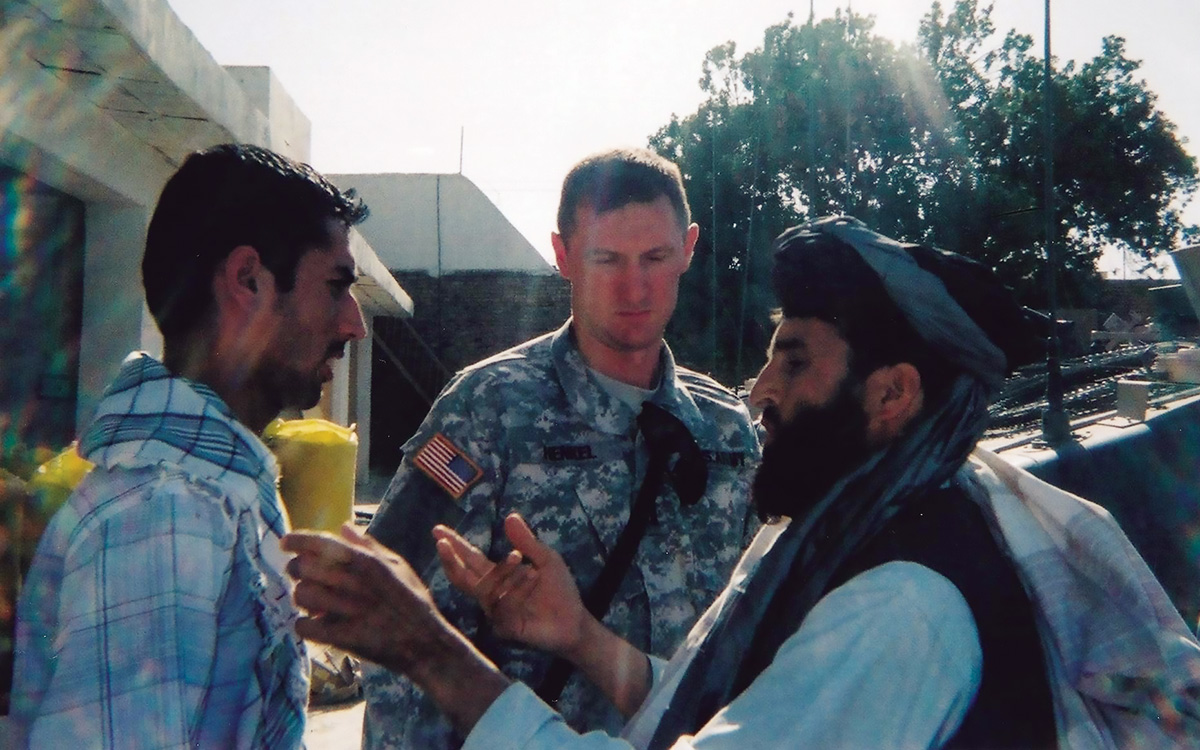
Captain Scott Henkel (at center) and Ahmad Khalid Siddiqi (at left)talking with a village elder in Mizan District of Zabul province, 2006.
U.S. Army
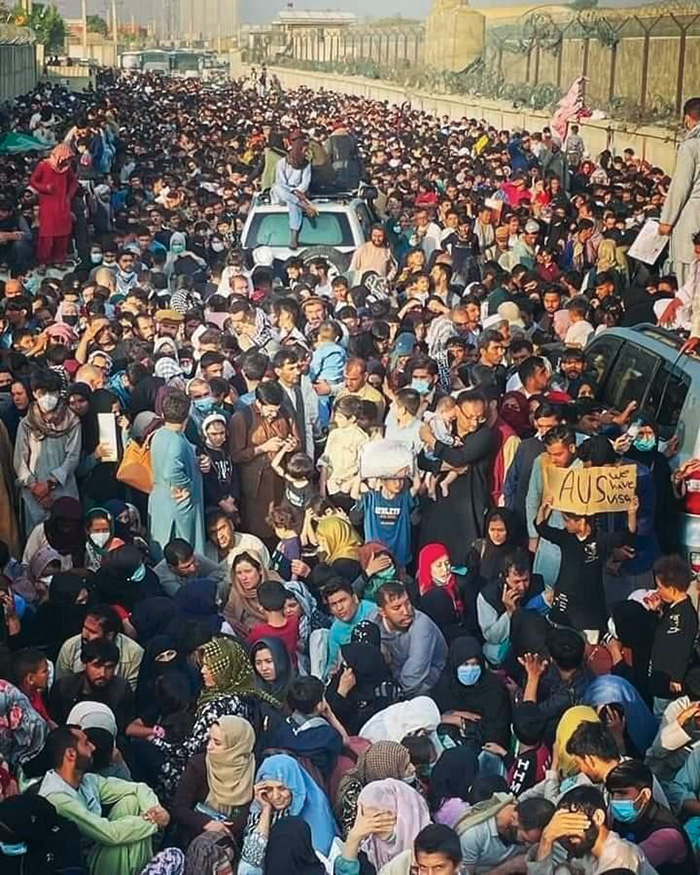
Crowds of Afghans trying to flee Kabul gathered outside the gates of Hamid Karzai International Airport, August 2021.
Courtesy of Ahmad Khalid Siddiqi
We were ambushed, we were attacked, we were doing a lot of overnight missions. It was not easy. It strengthened my resolve to work with my American colleagues to help the Afghan people.
In 2005, I started working with the civil affairs unit in Zabul province. We would go out, help communities with humanitarian assistance, provide them with clean water, support for education, women’s empowerment, girls to be allowed to go to school. In 2008, I joined the United Nations where I worked on the political process of elections as a political assistant, helping women’s empowerment, community empowerment, strengthening local governance.
At the end of 2008, I became the political assistant for the U.S. provincial reconstruction team in Panjshir province. We had one mission: the people of Afghanistan, and empowering them, making a system for Afghans to be able to independently run their country.
At the end of 2009, the U.S. mission in Afghanistan decided that it was time to do the handover. The transition was supposed to happen from U.S. forces to the Afghan government, whether it was security, development or budgeting. They believed there was enough capacity within the Afghan government to run their own government and to be able to prioritize their needs and their people’s needs.
Panjshir was the first province to be declared as fully transitioned to the Afghan government. Then I moved to Kabul and joined the U.S. embassy, as an executive office protocol assistant working with the schedules of the ambassador.
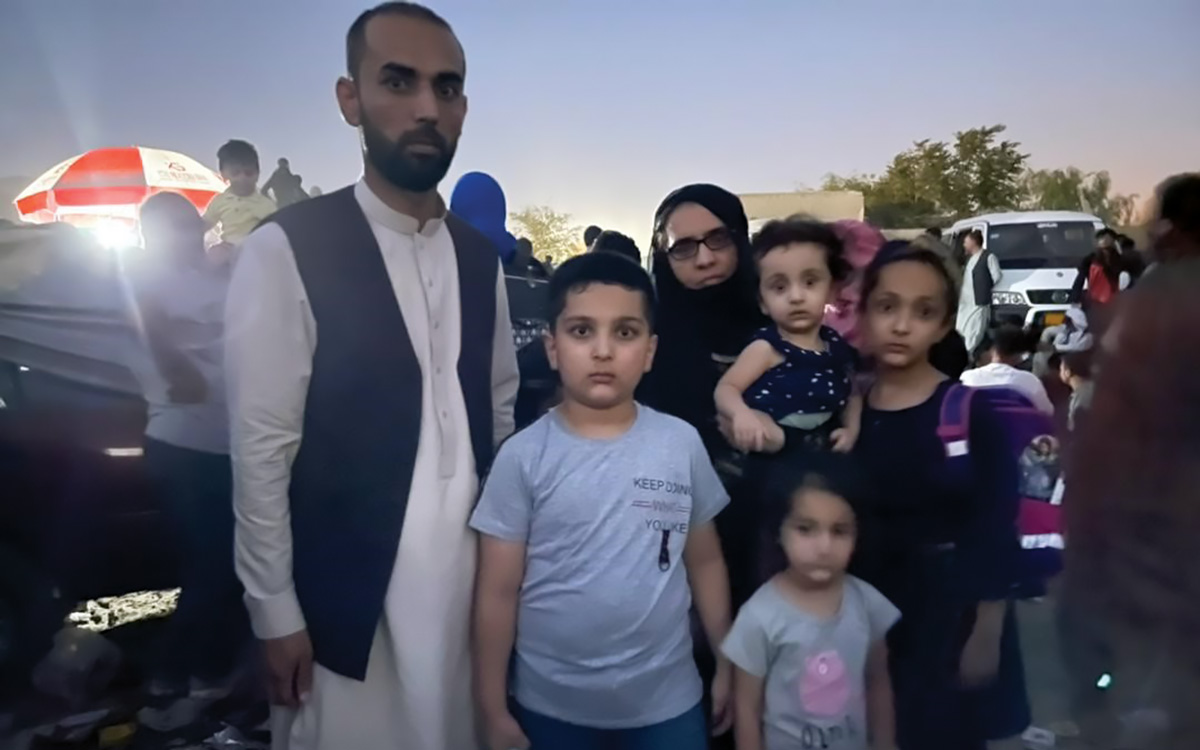
Siddiqi family at the Hamid Karzai International Airport, August 2021.
Courtesy of Ahmad Khalid Siddiqi
I started working for the U.S. government in 2003. Working for two years would allow you to get your Special Immigrant Visa [SIV] and move to the United States. I applied for an SIV in 2006. I never got it. I did not know a U.S. general to write a letter on my behalf. All the way to 2013 I tried. I put my life at risk. I put my kids’ lives at risk. I was working with the U.S. openly. I was accused of spying for the U.S. government. The visa was delayed and delayed, as I waited for my chance to move to the United States to start my life there.
And then in 2019, with the help of the embassy, my SIV was back on track. Homeland Security approved it, but then it was put on hold for further administrative processing.
It was still refused as of Aug. 15 [2021], when the Afghan government collapsed.
So I started contacting people. I said: “I worked for you guys for more than 10 years. I worked with your intelligence, your embassy, your army. Do you want me to get killed? Just Google my name. Hundreds of photos come up of me with ambassadors, with NATO leaders. You are putting my life at risk. You cannot leave me like this.”
My military friends were contacting U.S. Congress people, saying, “You cannot leave that guy behind.” It didn’t work.
Finally, on Aug. 22, a Special Forces unit that I worked with in 2006 contacted me through WhatsApp, and told their people inside the airport to go get me. They told me to go to a different gate.
There was a huge human sewage canal. They told me, “You have to go through this sewage canal.”
It was 9 o’clock in the evening. I gave my phone to an American Marine on the other side of the sewage canal, and I begged him, “Please, take my phone. Talk to this unit. He is your superior.”
So after a lot of talking, he took my phone. After 40 minutes, he came back and said, “Where’s your family?”
I said, “They are 200 meters away from here. Thousands of people are stuck over there.”
He said, “Go get your family.”
I had contacts in the United States; imagine the situation for people who do not have any contacts.
I have a 9-year-old daughter, an 8-year-old son, a 4-year-old daughter and an 18-month-old daughter. Pushing them through the crowd, my 9-year-old was crying. She said, “Dad, people are pushing and my chest is hurting.”
I did not want one day to be blamed by my kids, have them say: “Dad, you worked with the U.S. government, and now we’re being killed here. We can’t go to school here.”
I had to wade through that sewage canal—it was two meters high—carrying my kids on my shoulder, handing them one by one to the U.S. Army on the other side, then going back for the next one. I gave my third kid, my fourth kid, then I had to get my wife to jump into that sewage canal, walk through it all the way. The soldier pulled her up, and then I pulled myself out. We went to the line, they searched us, and they let us in.
We stayed at the airport that night. In the morning, we hopped on an Army airplane.
We ended up in Qatar. There, my kids were in a very bad situation. With all the other Afghans, with 10,000 people, the 18-month-old had heatstroke. After four days, a lot of back and forth, they put us on a plane. We didn’t know where we were going. During the seven-hour flight, we were squished in. The kids were on my lap, on their mom’s legs. We finally made it … to Sicily, Italy.
It was another huge garage. Thousands of people were there, and we were left for days. I was helping people with food distribution, translating in the clinic. After almost eight days, still my name had not shown up on the list. People who came with no documents, their names came on the list. I asked why, and they told me, “Homeland Security hasn’t approved you yet, so you have to wait.”
After eight days, I got approved. I made it to the airport in Philadelphia on Sept. 5 with my family.
We came in, we got the two-year stamp for humanitarian parole. We were moved to Fort Dix military base in New Jersey to complete the medical exam; I expected to be there for months. But a veteran in Colorado (who I had worked with in 2006-2007), his family and the community there said: “We won’t leave you there.”
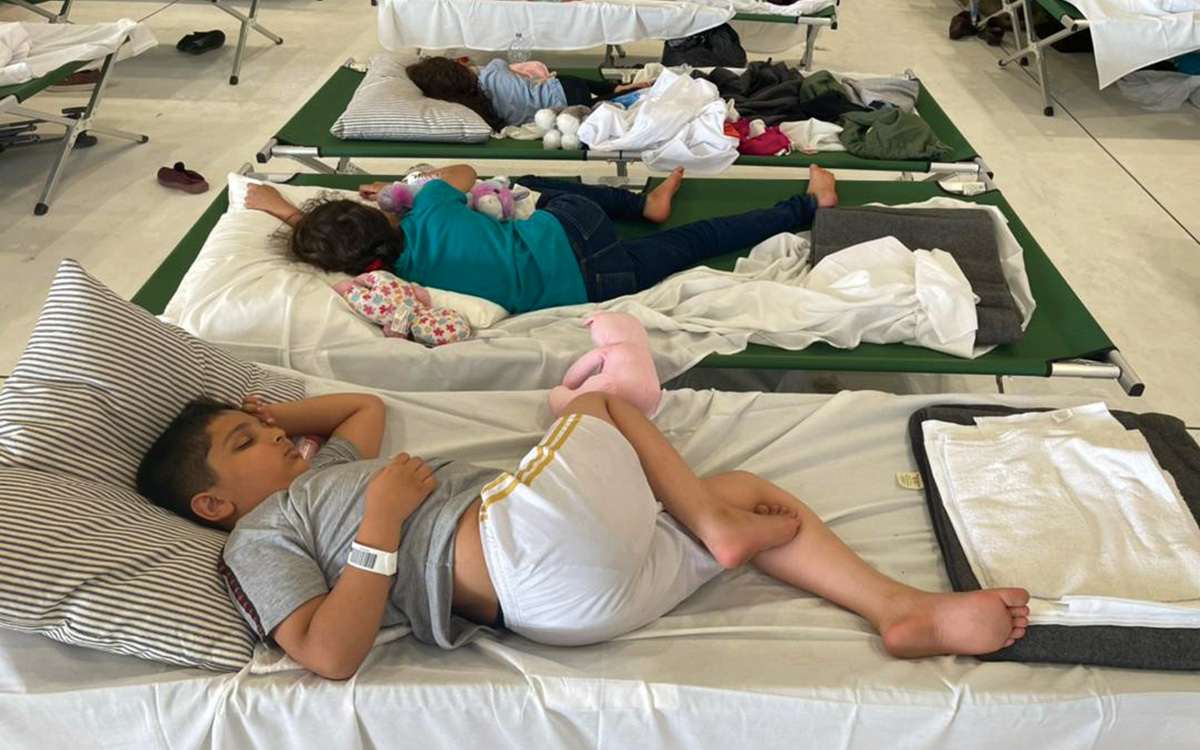
Son of Ahmad Khalid Siddiqi resting in transit to the U.S., at Naval Air Station Sigonella, Sicily, on Aug. 28, 2021.
Ahmad Khalid Siddiqi

Daughter of Ahmad Khalid Siddiqi at Al Udeid Air Base, Qatar, Aug. 25, 2021.
Ahmad Khalid Siddiqi
Congressman Joe Neguse, Congressman Jason Crow, the family of veteran Captain Scott Henkel, [town councilwoman] Heidi Henkel and the family, they all helped, and they pulled me out of there. They raised funding. They found me a house, and they brought me here to Colorado.
Yet if you go online to where you can search for the status of your visa case, my SIV is still refused. Now I’m here with a parole visa that ends in two years.
I left everything in Afghanistan. I only had one backpack when I came here.
On Sept. 15 of this year, they went and blew up my house in Panjshir because I was working with the U.S. government. Imagine if I was there, if I was not able to get out, still waiting for my SIV. What would have happened?
I have so many awards, from the Secretary of State and from many ambassadors. The Meritorious Honor Award. The Extra Mile Award for working extra hours for the 4th of July, for the U.S. presidential visit of Barack Obama to Afghanistan, for visits of senators to Afghanistan. For 20 years, two decades of war, work, dedication, honesty, everything, they deny my SIV. That hurts a lot.
I’m trying to apply for my green card, and my lawyer says I have all the documents, but my SIV case still says refused. I do not know how to get it reviewed and change the status so I can apply for my green card. I need that for work. I’m looking for a job.
Evacuation itself was a nightmare, honestly.
It was a veteran unit that got me out. The captain, his family, they were always in contact with me, asking: “Are you safe?” I was moving from one location to another so as to not be caught. They were in touch with me every day saying: “Hang on, we are working to get you out.”
I was very much welcomed in a nice way in Colorado. Captain Henkel and Heidi Henkel, the local city councilwoman, they made it home for us. We lost a lot, but the family and Broomfield community embraced us and took us in like their own. And 60 or 70 people are volunteering to help us any way they can. They’re visiting our house. They’re bringing their kids and making play dates with my kids. They’re helping financially, with housing, household items and many other things.
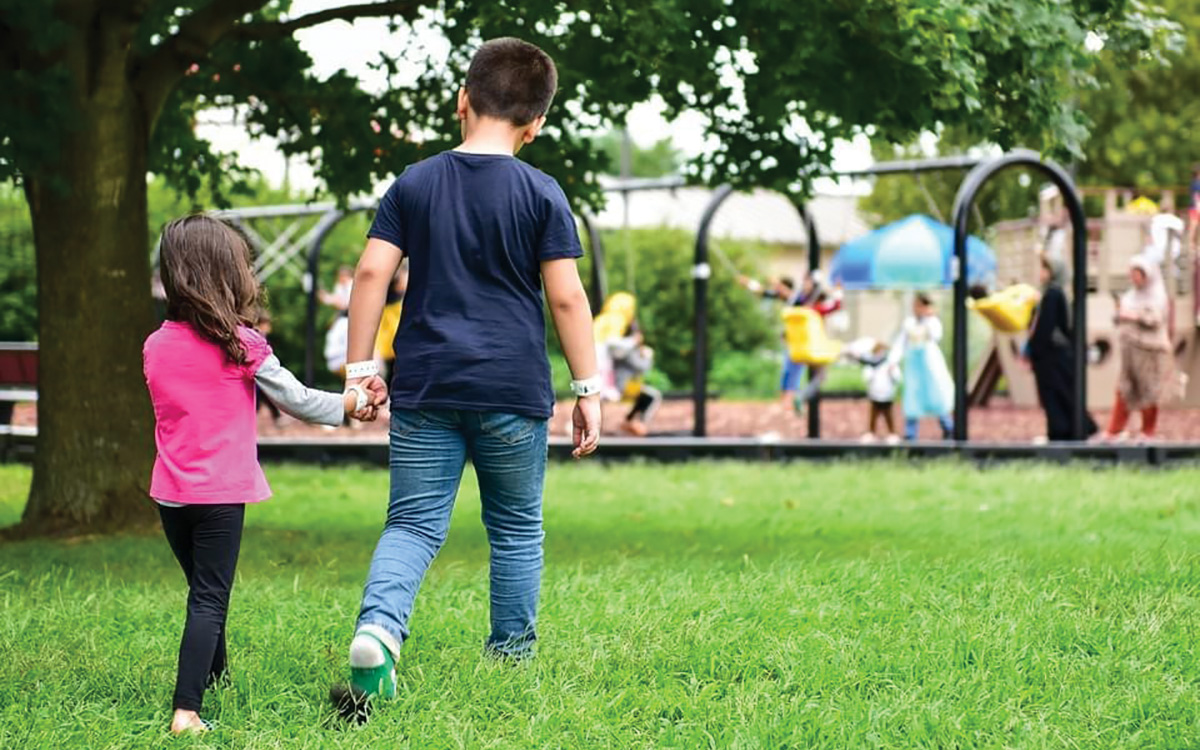
Siddiqi children head out to play at Fort Dix, New Jersey, Sept. 6, 2021.
Ahmad Khalid Siddiqi
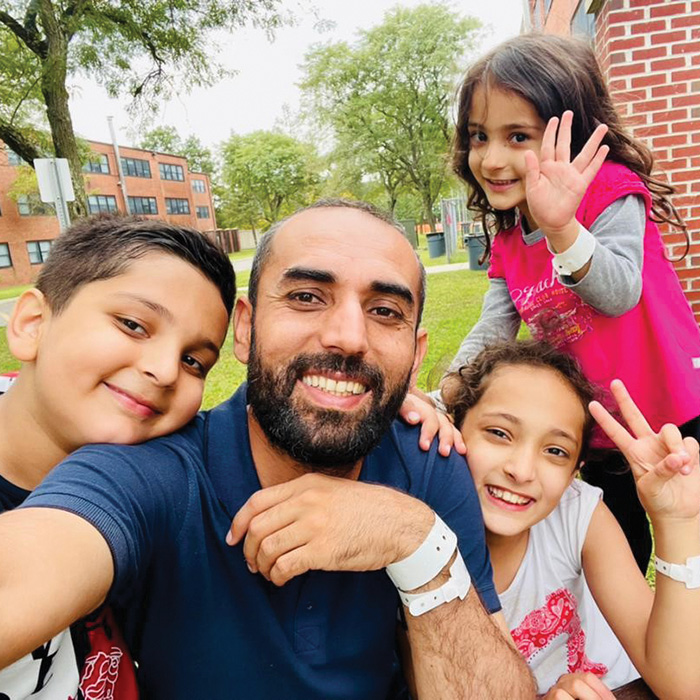
Ahmad Khalid Siddiqi with three of his children at Fort Dix, New Jersey, Sept. 5, 2021.
Ahmad Khalid Siddiqi
I was in such a difficult position, but I had contacts in the United States; imagine the situation for people who do not have any contacts. Imagine people who work as an interpreter in the worst conditions in a war zone. And now they’re not able to make it here and are under threat of death every day in Kabul.
People who were involved in diplomatic missions are still stuck in Afghanistan. There is no hope for them. They are just moving from one place to another. And I don’t know how long they will be able to skip around like that. If this darkened regime gets recognized, I’m telling you, they will slaughter every one of those who worked for the U.S. government.
As for what the U.S. government can do now, there are a lot of ways. The unit that is working on SIVs, they might need to get practical, find people who understand the Afghan people—a unit from the State Department, the military, Homeland Security and dedicated Afghans who have experience verifying documents.
Bring the heroes, the allies, to the U.S. I want the civil servant readers to realize that there is a lot of pain behind this history that I cannot explain here. By rejecting SIVs, you put a lot of lives in danger. Let’s fulfill the commitments to bringing our allies to the U.S., so they will not be victims of their jobs. Most of them were faithfully working side by side with U.S. soldiers, with U.S. government employees, and they deserve to be alive.
That’s one responsibility for the U.S., but the other responsibility is helping Afghans within the U.S. The resettlement agencies need to employ people who understand the culture of Afghanistan and have an understanding of how the evacuation happened, and should differentiate between illegal immigration and evacuation.
Not everybody who made it here is from the capital, Kabul. There are people from very remote parts of Afghanistan who have never been to the cities. They may ask stupid questions. They may ask questions again and again, and we have to have people in charge who have the capacity to understand that. Many refugees are not feeling welcomed.
Let’s work with the resettlement agencies to be more proactive, more responsive, more helpful. We as evacuees left everything behind. There should be a strong program to resettle Afghans, to help them to find places to live, jobs, a new sense of belonging.
This is not a story of just one family. It is the tragedy of all those who left Afghanistan, their homes, their savings, even their families.
Evacuation happened. But what happens after evacuation?
Read More...
- “‘It Just Disappeared’: Afghan Interpreter Tells Chilling Story of Escape, Thanks Broomfield Couple For Not Giving Up,” by Shaun Boyd, August 27, 2021
- “Afghan interpreter who helped rescue Biden in 2008 is evacuated from Afghanistan,” by Mariana Alfaro, The Washington Post, October 12, 2021
- “A Stranded Interpreter, and the Soldiers Who Would Not Let Go,” by Farnaz Fassihi, The New York Times, August 26, 2021

